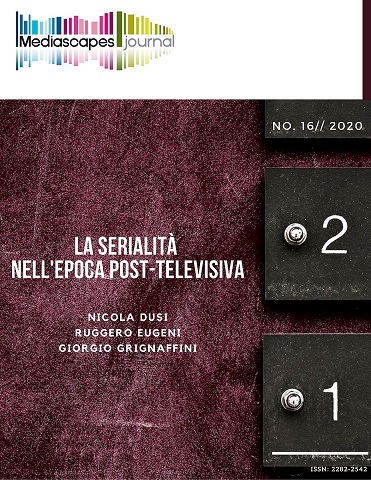Distopie contemporanee: Bandersnatch come evento seriale
Keywords:
Dystopia, Premediation, TV series, Black Mirror, InteractivityAbstract
The article investigates new forms of dystopic narration in relation to the emerging phenomenon of TV series and broader culture of media consumption. The spectacle of contemporary fragility is at the same time pre-mediated by hyperdiegetic narrations reproduced by the daily consumption of these media products. Zombies, vampires, lycanthropes, and all the kinds of monsters that used to inhabit the post-apocalyptic imagery have been introjected by human and post-human characters, struggling against both their interior consciousness and their technological and media prosthesis. In so doing, narratives of a dystopic future build a link with our post-media present, pointing to a wider cultural/epistemological issue. Reflexively, the same dystopic universe expands its limits by locating within its narrative and media structure the subjective and social experience of the audience. In this respect, the anthological series Black Mirror is emblematic in both representing and reproducing a diegetic and medial collapse between dystopic fiction and reality. In particular, the episode “Bandersnatch” actualizes this narrative and its temporalities in terms of interactivity as a mode of consumption. The spectator-user rather than being actually engaged in the narrative construction of the episode, is further integrated in the serial reproduction of the text itself, and of the dystopic media ecosystem in which both the episode and the audience’s experience occur.
Downloads
Published
How to Cite
Issue
Section
License
Mediascapes Journal is published under a Creative Commons Attribution Licence 4.0.
With the licence CC-BY, authors retain the copyright, allowing anyone to download, reuse, re-print, modify, distribute and/or copy their contribution. The work must be properly attributed to its author. It should be also mentioned that the work has been first published by the journal Anuac.
Having published these contributions for the first time, Mediascapes Journal will have the right to publish them integrally or partially as reprints or possibly as part of a thematic issue, in both digital and printed format.
It is not necessary to ask further permissions both to author or the journal.


